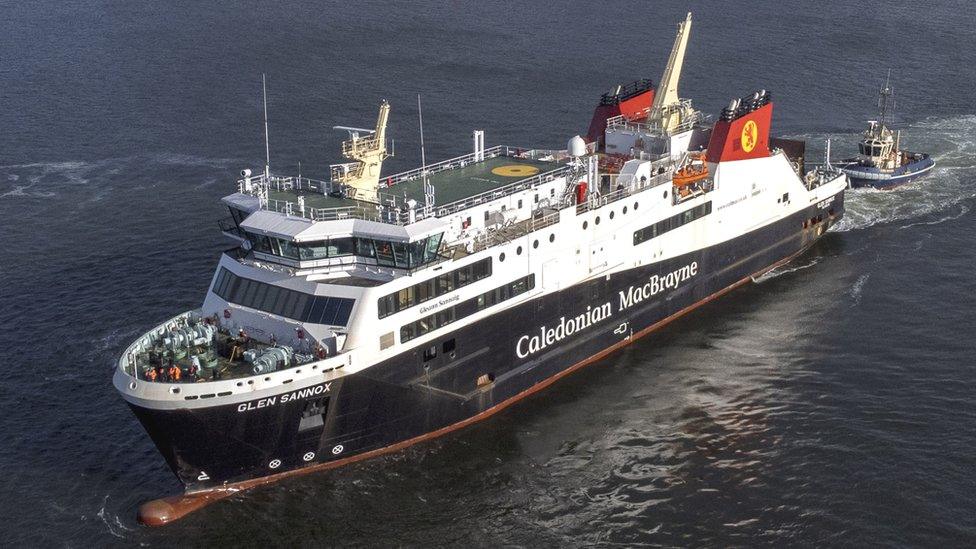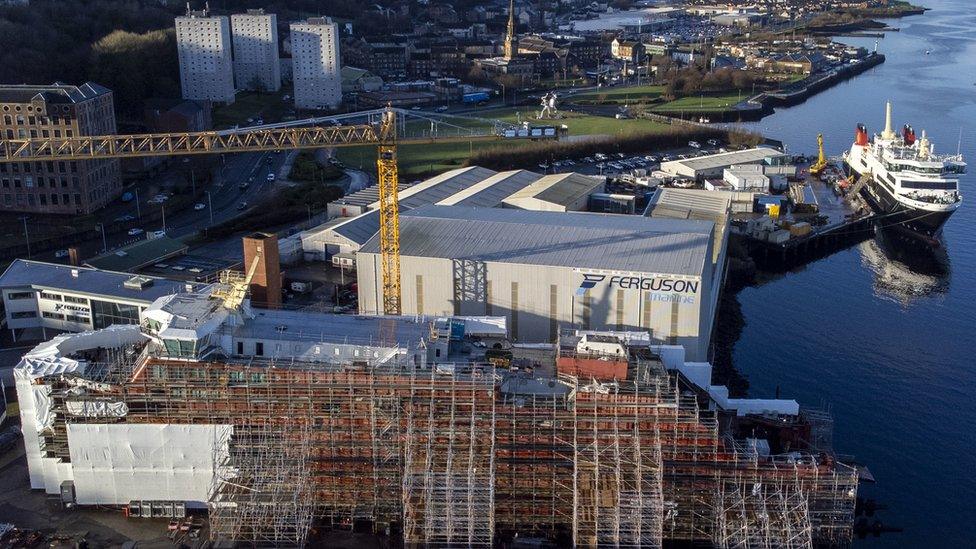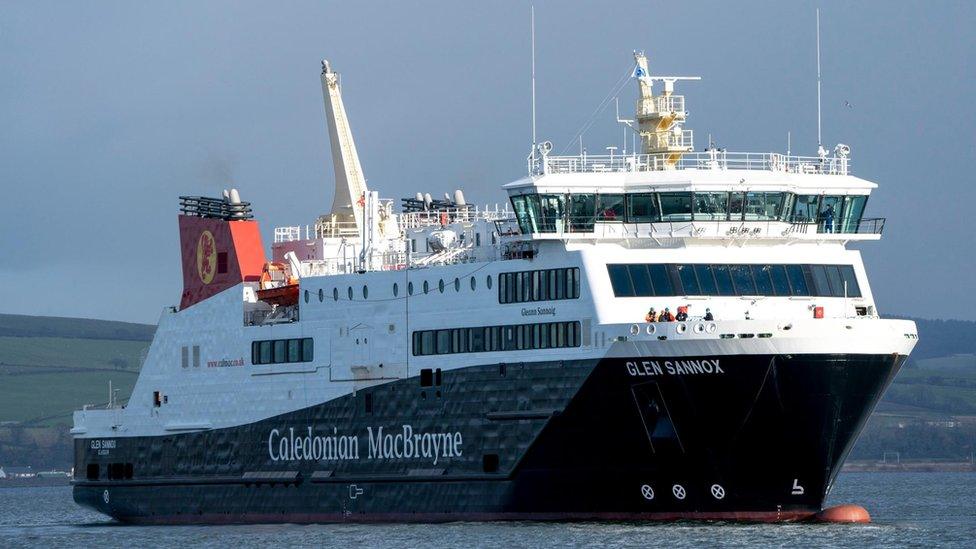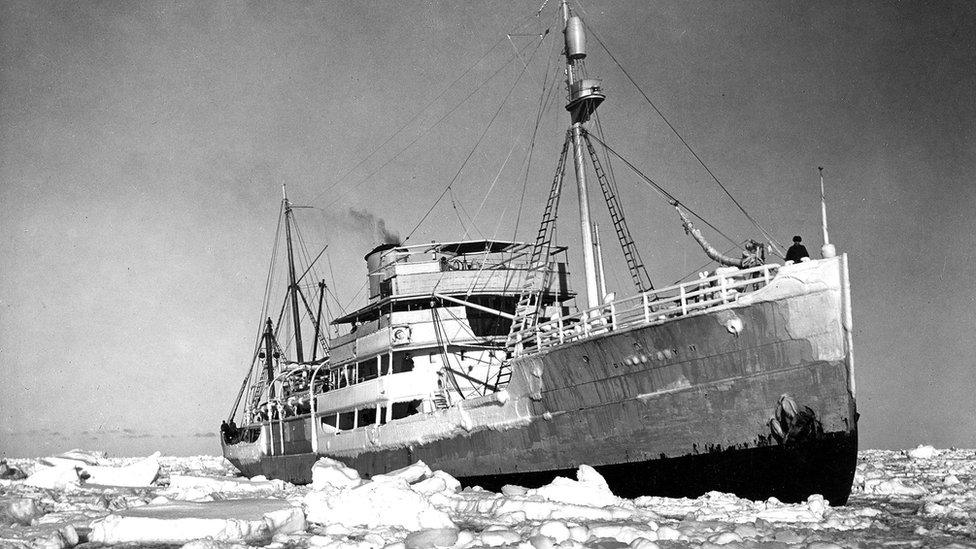Ferguson Marine: Calls for government to explain David Tydeman sacking
- Published

David Tydeman had indicated further delays to delivery of the Glen Sannox were "likely"
The Scottish government is facing calls to explain the sacking of the head of the company building two hugely delayed and over-budget CalMac ferries.
Ferguson Marine announced on Tuesday it had terminated the contract of chief executive David Tydeman.
The reasons for his departure were not revealed but it is understood it was over concerns about his performance.
The Scottish Conservatives have called on Economy Secretary Mairi McAllan to explain the decision at Holyrood.
Graham Simpson, the party's shadow transport minister, said Mr Tydeman was "widely respected" and "appeared to be delivering".
Mr Simpson has tabled an urgent question to the Scottish Parliament in an attempt to force the cabinet secretary to provide an explanation for the decision.
The cost of two ferries being built at the state-owned shipyard, the Glen Sannox and Glen Rosa, is running at nearly four times the initial £97m cost. They will also be delivered six years late.
Mr Tydeman joined the Port Glasgow shipyard in 2022, having previously run a yacht-building company.
On Tuesday Ms McAllan said it was "unacceptable" that he had intimated a further delay to delivery of the Glen Sannox was "likely". The vessel was supposed to be delivered in May.
The Glen Rosa is scheduled to be delivered "no later than" September 2025.
Mr Tydeman had recently attempted to highlight progress on the Glen Sannox, praising its performance in sea trials earlier this year.
"What Mairi McAllan has to do today is come to Parliament and tell us exactly what these performance issues are," Mr Simpson told the BBC's Good Morning Scotland programme.
"It is not acceptable to sack someone who is widely respected in the industry and not say what the issue is."
Scottish Labour have also said the "sudden overhaul" in senior personnel "raises serious questions and the public deserve transparency about what has happened".
'Paid the price'
Mr Tydeman's contract was terminated by Ferguson Marine amid a number of changes among the company's senior management.
Board chairman Andrew Miller said the shipyard needed "strong leadership to ensure its long-term future".
John McMunagle, co-convenor of the GMB union which represents workers at the yard, said they were "shocked and surprised" at Mr Tydeman's departure.
"David inherited an almost impossible job," Mr McMunagle told the BBC. "Arguably out of six or seven CEOs we have had, David has been the best of them.
"It is hard. David was probably optimistic in putting out dates that maybe weren't achievable and I think he has paid the price of that."

The Glen Sannox underwent sea trials in February ahead of its scheduled delivery this year
Mr McMunagle said the workforce nevertheless welcomed the appointment of non-executive director John Petticrew as interim CEO.
"John's obviously a shipyard man," he added. "He served his time in the local Greenock shipyard before moving to Canada. We met with him yesterday and we are going to throw our weight behind John and fully support him.
"With Glen Rosa going into the water on 9 April and Glen Sannox leaving for dry dock, it is going to leave us acutely short of work. We need to source some short-term work to keep this workforce busy."
Ferguson Marine's former owner, Jim McColl, told the BBC it was "appalling" that Mr Tydeman had been dismissed and that he "had no chance at all".
Mr McColl rescued the last civilian shipyard on the River Clyde from administration in 2014 and agreed the initial contract in 2015 to build the two ferries for CMAL - the government agency which owns and procures ships for CalMac.
He blamed "fundamental shortcomings in the specification" at the outset and constant design changes for the subsequent fiasco.
"David Tydeman is not the problem," Mr McColl said. "The fantastic workforce are not the problem. CalMac are not the problem. It is the design of the ferries and the incompetence of CMAL in this whole process."

Delivery of the Glen Sannox and Glen Rosa vessels have been plagued by delays
Construction of the two vessels, the first ships ever built by a UK shipyard capable of running on liquefied natural gas (LNG), has been plagued by design challenges since the order was placed in 2015.
Steel fabrication outpaced detailed design work, leading to errors and reworking, with repeated delays and cost increases that continued after the Port Glasgow yard fell back into administration and was nationalised in 2019.
In February, Mr Miller told MSPs it would be harder to return the business to the private sector without investment in a new automated plating line - with the company seeking further finance from the Scottish government.
The company is due to submit a new business case to ministers by the end of March.
In 2022, a number of Ferguson Marine workers who took part in an informal meeting with MSPs praised Mr Tydeman's leadership and compared him favourably to the shipyard's previous management, saying he "talked sense".
Related topics
- Published26 March 2024

- Published27 February 2024

- Published26 November 2023
